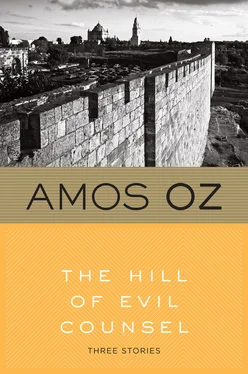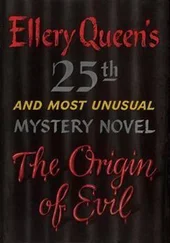At half past four there was another meeting of the local committee in my apartment. As I must have written to you already, even Kerem Avraham is setting up its own civil-defense council.
Four or five representatives of the neighbors came, including Mrs. Litvak, who qualified as a nurse before she married. She brought some homemade biscuits with her, and refused to allow me to help her serve the coffee; all I had to do was to tell her where I kept the sugar and the tray — no, no need, she'd already found them. She had found the lemon, too. And how wonderfully tidy my kitchen was! She would bring her husband, Litvak, here one day to let him see with his own eyes and learn a thing or two. The head of a school for workers' children, and he couldn't even wash a glass properly. Still, it was her fate. She mustn't complain.
And so the meeting began, while we were still being served coffee and shortcake, and I was being treated like a guest in my own home.
"Well," said Mrs. Litvak, "let's get down to business. Dr. Nussbaum, would you like to begin."
"Perhaps we might take up where we left off last week," I suggested. "There's no need to start from scratch every time."
"We were talking about the possibility of an apartment we could use as an HQ," Comrade Lustig said, "somewhere where the committee could organize itself, which could be manned day and night in an emergency. Or at least a room, or a basement."
He spoke standing up, and when he had finished he sat down. Lustig is a little man, with puffy bags under his brown eyes, and a perpetual look of silent amazement on his face, as though he has just been called some terrible name in the street for no reason. Zevulun Grill, a flaming redhead, whose two missing front teeth give him the look of a dangerous brawler, added:
"We were also talking about a radio transmitter. And, as usual, we did nothing about it."
Ephraim Nehamkin, the curly-haired radio technician, nodded his head twice, as if Grill's words corresponded precisely to what one might expect from him, and anyone who harbored any illusions about him had better wake up before it was too late.
"Ephraim," I said, "it might be better if we conducted our discussion by means of words, rather than dumb show. Perhaps you'd like to tell us all what has made you so angry?"
"We've got one," Ephraim growled. "It's always the same old story with us: we talk about the past instead of the present."
"What have we got?"
"A radio. Didn't I say last week that I was putting a battery transmitter together for you. Anyway," he suddenly exploded, "what the hell do we need a transmitter for? To beg the English to do us a favor and stay here to save us from the Arabs? To prick the conscience of the world with biblical quotations? To explain nicely to the Arabs that they mustn't kill us, otherwise there'll be no one to cure their ringworm and their trachoma? What's the point of this whole committee, with two doctors and a bus driver? What the hell do you think you're doing?"
"Don't get so steamed up," Nachtshe said, smiling. "Simmer down. Everything'll be all right."
Nachtshe is a slim, strongly built young man who is a sort of occasional leader in one of the Socialist youth movements. His short trousers displayed his muscular, hairy legs. His hair was tousled. You must have heard of his father, Professor Guttmacher, the expert on Oriental mysticism, a world-famous scholar who is semiparalyzed. Sometimes, in the evenings, Nachtshe and his young charges light campfires in the woods, carry out night exercises with quarterstaves, or make the neighborhood re-echo to songs of rage and longing sung to Russian tunes.
"Instead of poking fun, why don't you tell us what you suggest," Grill demanded of Ephraim Nehamkin.
"An attack," Ephraim erupted in a deep growl, as if his heart were hoarse with emotion. "Organize a raid. That's what I suggest. Take the initiative. Go out to the villages. Shu'afat. Sheikh Jarrah. Issawiya. Burn down the mufti's house in the middle of the night. Or blow up the Najjara HQ. Hoist the blue-and-white flag on the minaret of Nabi Samwil, or even on the Temple Mount. Why not. Let's make them tremble, at long last. Let them start sending us deputations. Let them plead. What's the matter with us all."
At this point, Dr. Kipnis, the vet from Tel Arza, intervened. He was standing with his back to the window, wearing a gray battle-dress blouse and neatly pressed long khaki trousers. As he spoke, he kneaded his brown cap between his fingers, and he looked not at Ephraim but at Mrs. Litvak, as though she — or her black coif — were giving him hints on some vital principle.
"It seems to me, ladies and gentlemen," he began cautiously, "that we are venturing along the wrong road. I may claim to have some acquaintance with the neighboring villages."
"Of course you have," Ephraim whispered venomously. "Only they know you, too, and other Jews like you, and that's what's whetted their appetite."
"Excuse me," said Dr. Kipnis, "I didn't mean to get into an argument with you about your principles. At any rate, not at this moment. All I wanted to do was to try to evaluate the present situation, to discover what the possible lines of development are, and to make one or two suggestions."
"Let's get organized!" Comrade Lustig suddenly exclaimed, and he even thumped on the table. "Quit chattering! Let's get organized!"
As for me, the chairman, it was only with some difficulty that I resisted the temptation to return Nachtshe's fleeting smile, which was apparently directed at me alone.
"Dr. Kipnis," I said, "please continue. And it would be better if we did not keep interrupting one another."
"Very well. We have three possibilities open to us," said Dr. Kipnis, raising three piteously thin fingers and folding one of them back with each possibility he enumerated. "Firstly, the committee hands the whole country over to the Arabs, and we have to choose between a new Masada and a new Yavneh. Second, it recommends partition, and the Arabs either accept the verdict or have it imposed on them with the help of foreign powers. Not the British, naturally. In this eventuality, one of our tasks will be to be prepared for possible riots and — at the same time — to attempt to restore good relations with the Arab districts that surround us. To bury the hatchet, as they say."
"They must be driven out," Ephraim said wearily, "expelled, kicked out, what's the matter with you, let them go back to the desert where they belong. This is Jerusalem, Mr. Kipnis, the Land of Israel — maybe you've forgotten that, with your appeasement."
"Thirdly," the vet continued, apparently determined not to be deflected from his purpose by provocations, "total war. And in that case our local committee will not, of course, function independently, but will await orders from the national institutions."
"That's what I said," Lustig exclaimed delightedly, "we must get organized, organized, and again organized!"
"Dr. Kipnis," I insisted, "what exactly are you suggesting?"
"Yes, well. First of all, a delegation representing us, the Jewish districts of northwest Jerusalem, approaches the Jewish Agency, to explain the special difficulties arising from our geographical situation and to request instructions. I propose Dr. Nussbaum, Mrs. Litvak, and, naturally, Comrade Nachtshe. Second, a meeting with our neighbors. I mean the sheikhs and mukhtars. I am willing to volunteer myself for this assignment. We inform them that we, the inhabitants of the Jewish districts of northwest Jerusalem, will not take any hostile initiative, but will continue, no matter what happens to maintain neighborly relations. So that if they nevertheless choose the course of bloodshed, all the responsibility will fall on them, and they must accept the consequences and cannot complain that they have not been warned. And now I suggest that Comrade Nachtshe talk to us about the defense of our districts. He should at least outline the plans, on the assumption that we may have to withstand a local assault on our own for a while. That is all I have to say."
Читать дальше











